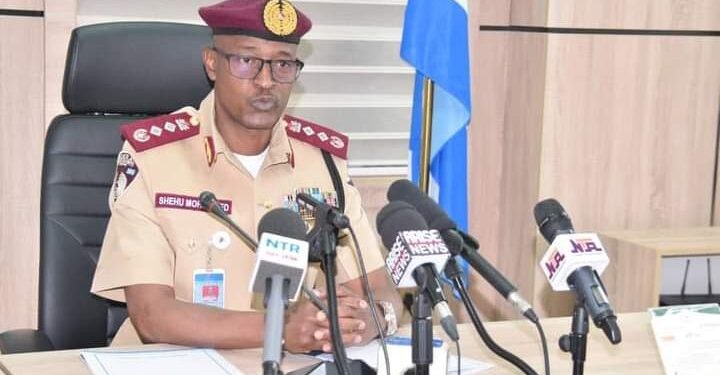The debate over how to make Nigeria’s highways safer has taken a dramatic turn as Shehu Mohammed, Corps Marshal of the Federal Road Safety Corps (FRSC), publicly suggested that arming road safety officers with firearms may be the only effective way to enforce traffic laws. His comments have ignited nationwide discussion on whether the country’s road safety personnel should be empowered with weapons to improve compliance and curb corruption.
Mohammed, who oversees Nigeria’s leading road safety agency, underscored the daunting realities his personnel face daily. According to him, FRSC patrol units — often comprised of just four officers — are routinely expected to halt massive vehicles like trailers, tankers, and trucks carrying dozens of passengers, animals, or heavy cargo. In many cases, he said, this task is simply impossible without greater enforcement tools.
ALSO READ: China Introduces New K Visa for Young STEM Professionals Starting October 2025
“How do you stop a trailer or a tanker on the road? How do you just do that? It’s very, very difficult,” Mohammed asked rhetorically during a recent briefing. “A truck, especially one with 100 passengers on top, animals, and other cargo, is extremely hard to stop when you only have four personnel on patrol. How do you do that?”
His statements draw attention to a long-running issue in Nigeria’s transport system: noncompliance with traffic laws by commercial and heavy-duty vehicle operators. These violations, including reckless driving, overloading, and speeding, are major contributors to the country’s high accident rates. According to Mohammed, the absence of stronger enforcement power leaves the FRSC handicapped, with officers often unable to compel obedience from errant drivers.
“It [a gun] will support,” he added. “If you don’t have the power to enforce anything, there’s no way you can achieve that enforcement.”
Mohammed also pointed to the persistent issue of corruption within the FRSC as another reason for drastic reform. He revealed that the corps records more dismissals and terminations related to bribery than many comparable agencies. In his view, enhancing the authority of road safety personnel through armed enforcement could not only deter reckless drivers but also instill greater discipline and professionalism within the corps itself.
The proposal, however, raises difficult questions about the militarization of a civilian safety agency. Critics argue that introducing firearms into the FRSC could escalate confrontations and erode public trust. Others, however, see Mohammed’s comments as a necessary wake-up call, emphasizing that road safety enforcement is not merely administrative but increasingly a matter of public security.
Nigeria’s highways, among the busiest in West Africa, are vital for moving goods and people across the country. Yet they remain notoriously dangerous, plagued by over-speeding, under-regulated commercial transport, and, at times, criminal activity such as armed robbery and kidnapping. FRSC officers have often been caught in the crossfire of these challenges, underscoring the risks they face in the line of duty.
Supporters of Mohammed’s view say that arming road safety personnel could deter lawlessness on highways much as armed customs or immigration officers deter smuggling at borders. They argue that the threat of force would compel drivers to comply with orders, thereby reducing accidents and saving lives.
Still, any move to arm FRSC personnel would require legislative approval and careful policy planning, including training, rules of engagement, and accountability mechanisms. Without these safeguards, experts warn, the solution could create more problems than it solves.
For now, Mohammed’s statement has succeeded in placing the conversation on the national agenda. Whether Nigeria opts to empower its road safety officers with firearms or explores alternative strategies, one thing is clear: the status quo is failing to deliver the enforcement needed to ensure road safety on the country’s sprawling highway network.


